Diana Nammi | |
|---|---|
 Nammi in 2014 | |
| Born | Iran |
| Nationality | British |
| Occupation | Activist |
Diana Nammi is a Kurdish and British activist. [1] She received a Barclays Woman of the Year Award in 2014. [1] She was also named one of the BBC 100 Women in 2014. [2]
Diana Nammi | |
|---|---|
 Nammi in 2014 | |
| Born | Iran |
| Nationality | British |
| Occupation | Activist |
Diana Nammi is a Kurdish and British activist. [1] She received a Barclays Woman of the Year Award in 2014. [1] She was also named one of the BBC 100 Women in 2014. [2]
Nammi was born in Iran. Her father was a progressive thinker, who inspired her later activist work. [1] Nammi was thrown out of school in Sanandaj at 14 for throwing food at a belligerent teacher who had accused her of being promiscuous. [3] She went on to organize protests in favor of "secularism, equality and human rights" during the 1979 Revolution. [3] Nammi was nearly arrested as a teenager for speaking up for the rights of women. She went on to join up and fight for 12 years as a Peshmerga freedom fighter in Kurdistan, often as a front-line fighter. She continued to speak out for women's rights. [1] [4] She became pregnant in 1991, and fled to Iraq, Turkey, and finally to the United Kingdom in 1996 to raise her child in safety after a chemical bomb attack killed 35 people near the radio station where she worked. [1] [3] [4] Nammi was granted asylum in the UK. [4]
Nammi founded the Iranian and Kurdish Women's Rights Organization (IKWRO) in her home in 2002. She founded the organization when the translator who helped Nammi and her daughter settle in the United Kingdom was killed. The translator was killed by her own husband, and the police did not wish to call it an "honor crime" as they believed it was an issue of culture. Nammi was outraged, and founded the organization to argue against "us[ing] culture to justify murdering women." [1] IWKRO strove to provide counseling and advice for women that were from the Middle East, North Africa, or Afghanistan or raised in their communities. As of 2014, the organization had 16 paid staff and has helped over 780 women in-person. [1] Nammi has been an outspoken advocate against honor killings, forced marriage, female genital mutilation, and the rights of women to divorce in religious marriages. [1] [5] The IKWRO works to provide women with legal access and safe places for women to go for refuge. [5] [6] The organization also works to bring issues of honor attacks and honor killings to the attention of the larger public. [7] In 2013, Nammi joined The National Commission on Forced Marriage to help eliminate practices of forced marriage in the United Kingdom. [8] Nammi and her organization were central in getting two of the killers of Banaz Mahmod, who was killed in an honor killing, extradited to the United Kingdom for prosecution. [3] [9] This was the first ever extradition of its kind. [9] Nammi organized a campaign, entitled "Justice for Banaz," that called for the extradition. The men were later convicted. [9] Nammi considers this extradition her chief success. [3] Nammi also played a central role in changing law in the UK to ban forced marriage. [9] Nammi continually advocates for schools, police, and other sources of services to the public to be educated on how to help victims of forced marriage or honor violence. [9] [10]
In 2012, Nammi was named one of the 150 Women Who Shake The World by Newsweek and The Daily Beast. [11] Nammi received a Barclays Woman of the Year Award in 2014. Nammi also received a Women on the Move Award from UNHCR in 2014. [12] Also in 2014, she was named one of the BBC's 100 Women. [2] She received a Voices of Courage Award from the Women's Refugee Commission in 2015. [5] Also in 2015, in recognition of her contributions to legal issues, she was named a part of the Inspired by Law gallery by students at London South Bank University. [9] [13] In same year, she was named one of the Women of the Year by the magazine Red. [14] In 2016, she was awarded an honorary degree from the University of Essex. [15]
She speaks in publicly regularly to defend the rights of women. Her TEDx speech has been viewed thousands of times of YouTube.[ citation needed ]

Deeyah Khan is a Norwegian documentary film director and human rights activist of Punjabi/Pashtun descent. Deeyah is a two-time Emmy Award winner, two time Peabody Award winner, a BAFTA winner and has received the Royal Television Society award for Best Factual Director. She has made seven documentaries to date, all have been shown on ITV in the UK as part of its Exposure series.

Forced marriage is a marriage in which one or more of the parties is married without their consent or against their will. A marriage can also become a forced marriage even if both parties enter with full consent if one or both are later forced to stay in the marriage against their will.

Hatun "Aynur" Sürücü was a Kurdish-Turkish woman living in Germany whose family was originally from Erzurum, Turkey. She was murdered at the age of 23 in Berlin, by her youngest brother, in an honor killing and sororicide. Sürücü had divorced the cousin she was forced to marry at the age of 16, and was reportedly dating a German man. Her murder inflamed a public debate over forced marriage in Muslim families.
Kurdish women have traditionally played important roles in Kurdish society and politics. In general, Kurdish women's rights and equality have improved dramatically in the 21st century due to progressive movements within Kurdish society. However, despite the progress, Kurdish and international women's rights organizations still report problems related to gender inequality, forced marriages, honor killings, and in Iraqi Kurdistan, female genital mutilation (FGM).
An honor killing, honour killing, or shame killing is the murder of an individual, either an outsider or a member of a family, by someone seeking to protect what they see as the dignity and honor of themselves or their family when they think that the individual has violated their or their family's reputation. Honor killings are often connected to religion, caste, other forms of hierarchical social stratification, or sexuality. Most often, it involves the murder of a woman or girl by male family members, due to the perpetrators' belief that the victim has brought dishonor or shame upon the family name, reputation or prestige. Honor killings are believed to have originated from tribal customs. They are prevalent in various parts of the world, especially in MENA countries, the Philippines, and the Indian subcontinent especially in India, Pakistan and Nepal, as well as in immigrant communities in countries which do not otherwise have societal norms that encourage honor killings. Honor killings are often associated with rural and tribal areas, but they occur in urban areas as well.

Fadime Şahindal was a Kurdish immigrant who moved to Sweden from Turkey at the age of seven. She was murdered by her father, Rahmi, in January 2002 in an honour killing.
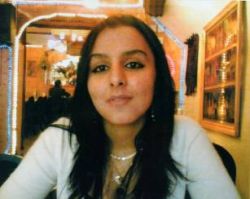
Banaz Mahmod was a 20-year-old Iraqi Kurdish woman who lived in Mitcham, South London, England. She was murdered on the orders of her family in a so-called honour killing because she ended a violent and abusive forced marriage and started a relationship with someone of her own choosing. Her father, uncle and three cousins were later convicted of her murder.

Kurds in the United Kingdom or British Kurds refers to people of Kurdish origin born in or residing in the United Kingdom.
Honour killings in Pakistan are known locally as karo-kari. According to the Human Rights Commission of Pakistan, over 470 cases of honour killings were reported in Pakistan in 2021. But human rights defenders estimate that around 1,000 women are killed in the name of honour every year. An honour killing is the homicide of a member of a family or social group by other members, due to the belief the victim has brought dishonour upon the family or community. The death of the victim is viewed as a way to restore the reputation and honour of the family.
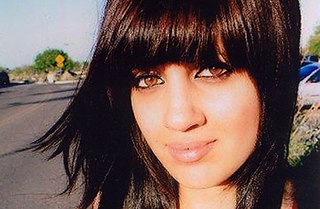
Noor Faleh Almaleki was an Iraqi American woman whose father killed her by striking her with a motor vehicle in an honor killing.
The status of women in Iraq at the beginning of the 21st century is affected by many factors: wars, sectarian religious debates concerning Islamic law and Iraq's Constitution, cultural traditions, and modern secularism. Hundreds of thousands of Iraqi women are widowed as a result of a series of wars and internal conflicts. Women's rights organizations struggle against harassment and intimidation, while they work to promote improvements to women's status in the law, in education, the workplace, and many other spheres of Iraqi life, and to curtail abusive practices such as honor killings and forced marriages.
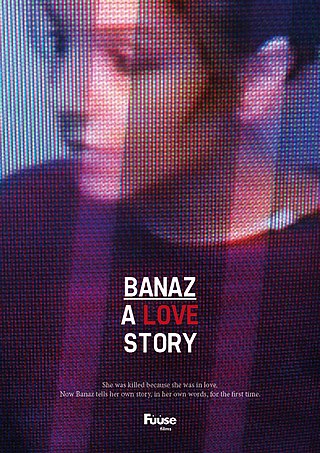
Banaz: A Love Story is a 2012 documentary film directed and produced by Deeyah Khan. The film chronicles the life and death of Banaz Mahmod, a young British-Iraqi woman of Kurdish origin killed in 2006 in South London on the orders of her family in a so-called honour killing. The film received its UK premiere at the Raindance Film Festival in London September 2012.
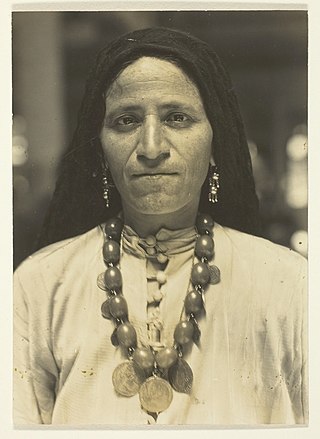
Women in Syria constitute 49.9% of Syria's population. According to World Bank data from 2021, there were around 10.6 million women in Syria. They are active participants not only in everyday life, but also in the socio-political fields. Syrian women and girls still experience challenges in their day-to-day lives, for example in the area of law and health care.

Tabassum Adnan is a Pakistani women's rights activist from the Swat Valley. She won the U.S. State Department's 2015 International Women of Courage Award for her efforts in seeking justice for Pakistani women.
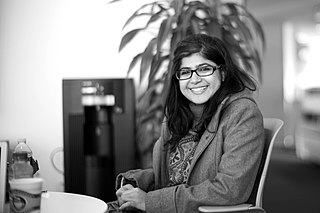
Khalida Brohi is a Pakistani activist for women's rights and a social entrepreneur. She is a member of the Brahui people, an indigenous tribe of Balochistan, and now has been settled in United States after her marriage.

Nafiseh Kohnavard is a multilingual correspondent who is focused on Middle East issues for BBC World Service/ BBC Persian.

Sara Mohammad is an Iraqi Kurdish-born Swedish human rights activist and pharmacist. She claimed asylum in Sweden as a quota refugee in 1993 after fleeing from her child marriage a day before the wedding. Her brother had threatened to shoot her, holding a Kalashnikov rifle to her head. After Fadime Şahindal was murdered in Uppsala in 2002, Mohammad founded Gapf, an organization which campaigns against honour killing.

Heshu Yones was a 16-year-old Iraqi Kurd from Acton, London who was murdered by her father in an honour killing. Abdalla Yones killed his daughter for becoming too "westernised" and for engaging in a relationship against his orders. He was sentenced to life in prison in September 2003, with a minimum term of fourteen years.
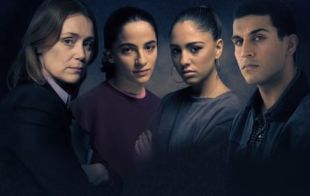
Honour is a two-part British television drama, depicting the investigation into the real-life disappearance and murder of honour killing victim Banaz Mahmod.
An honor killing, honour killing, or shame killing is the murder of an individual, either an outsider or a member of a family, by someone seeking to protect what they see as the dignity and honor of themselves or their family. Honor killings are often connected to religion, caste and other forms of hierarchical social stratification, or to sexuality, and those murdered will often be more liberal than the murderer rather than genuinely "dishonorable". Most often, it involves the murder of a woman or girl by male family members, due to the perpetrators' belief that the victim has brought dishonor or shame upon the family name, reputation or prestige. Honour killings are believed to have originated from tribal customs. They are prevalent in various parts of the world, natively in MENA countries and in South Asia especially in India, Pakistan and Nepal, as well as in immigrant communities in countries which do not otherwise have societal norms that encourage honor killings. Honor killings are often associated with rural and tribal areas, but they occur in urban areas too. Although condemned by international conventions and human rights organizations, honor killings are often justified and encouraged by various communities.